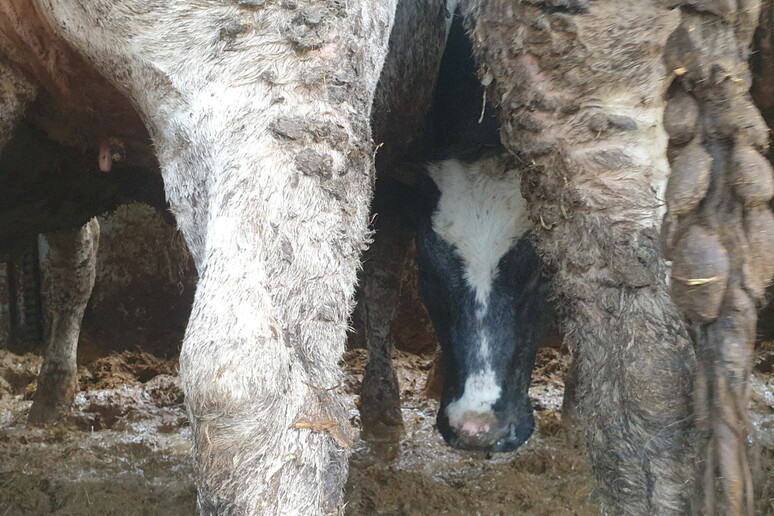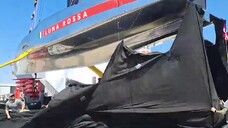Se hai scelto di non accettare i cookie di profilazione e tracciamento, puoi aderire all’abbonamento "Consentless" a un costo molto accessibile, oppure scegliere un altro abbonamento per accedere ad ANSA.it.
Ti invitiamo a leggere le Condizioni Generali di Servizio, la Cookie Policy e l'Informativa Privacy.
In evidenza
Extra
PressRelease
An ordeal that ends on a plate in a tourist resort: Live transports of calves to the Canary Islands
PressRelease - Responsabilità editoriale di news aktuell
Every week, cattle are shipped to the Canary Islands under unacceptable conditions. These transports are extremely long. The animals stand on the truck for even more than 100 hours non-stop. Now, in summer, sweltering heat must be added as well as poor water supply, no or too little food, bedding of excrements and urine, lack of space, and an acrid ammonia smell. Once on the islands, the animals, only a few months old, await death in the slaughterhouse. A trade that is enhanced by subsidies and slaughter premiums[1].
The calves slaughtered on the Canary Islands come e.g., from France, Spain, Germany, the Netherlands, Ireland, or Denmark. Some already have a long-distance transport behind them, because they were brought to northern Spain for fattening when they were only a few weeks old. Others are sent directly from their country of origin on one of the longest transports within the European Union (EU). The ferry crossing from the southern Spanish port of Cádiz alone takes at least one and a half days. But before that, the animals are sometimes already on the road for days. And once they arrive on the Islands, the odyssey continues: long waiting times due to poor organisation, reloading onto smaller trucks or island hopping from the main islands to one of the smaller Canaries.
It is scientifically proven and beyond question that long-distance transports are extremely stressful and dangerous for the animals. The situation becomes particularly dicey when the temperatures are high. Due to the lack of space in the vehicles, the animals have no chance to move away from each other and to regulate their body temperature. Usually, they also have no opportunity to lie down, and if they do, the risk of injury is high because they are easily trampled by the others. Thus, being forced to stand, the constant movement on the swaying ship quickly leads to total exhaustion. Added to this are thirst, hunger and the acrid ammonia smell of their urine and faeces.
According to the EU animal welfare laws, cattle may be transported for a maximum of 29 hours, after which they must be unloaded from the truck for 24 hours to be cared for and rested in a stable. But for ferry transports within the EU, the legislator makes an absurd exception: the journey is considered as sea transport and therefore counts as neutral time which means that the time on board the ferry is not added up to the transport time. This is despite the fact that the animals have to remain on the ship in the cramped truck and ferry transport is most likely even more stressful than road transport.
In July and August 2022, the animal welfare organisationAnimals' Angels documented, together with the Spanish partner organisation ANDA, several animal transports on this route. The results of the on-site research are shocking: one dead calf, temperatures up to 39°C inside the trucks during the sea crossing, and hours of waiting for unloading after arrival on the Canaries. Trucks not even carrying a stalk of food for the animals for the crossing, as well as completely soaked and smelly bedding. Chaotic reloading of the animals at the roadside, and an onward journey from Tenerife to the island of La Palma without giving the animals a break. All these examples are violations of the EU transport regulation. The condition of the fattening farms is also devastating in some cases. On Gran Canaria, a transport takes us to a huge facility where we also meet some German calves. The barn is completely filthy, some of the animals are crowded together at over 30°C and stand ankle-deep in dung under a low iron roof. Others are exposed to the blazing sun without protection.
What also shocks us is the complicity of the official veterinarians. Because of the continuing heat wave in Spain, all these transports should have been banned. The indifference of the veterinary services is also terrible: a French official veterinarian authorized a transport from the south-east of France via Cádiz and Tenerife to the island of La Palma confirming that it would only take 12 hours. In fact, this transport took more than 100 hours.
"I am shocked every time by what 'slaughter' animals have to endure in the EU. Every transport means stress and suffering for the animals, but this route is particularly awful because of its extreme length and the high swell on the Atlantic," says Chloé Favorel, project assistant at Animals' Angels.
In their joint position paper on the revision of EU legislation on animal transport, Germany, the Netherlands, Belgium, Denmark, and Sweden call for the introduction of a maximum transport time of eight hours for all animals destined for slaughter and that the time spent in a truck loaded onto a ship should not be considered as rest time but as transport time.
We very much welcome these demands. It is high time that an end is put to the completely unnecessary and agonizingly long transports of animals destined for slaughter.
The French bull calf Louis, transported to the Canary Islands under unacceptable conditions. © Animals’ Angels, August 2022.
[1]E.g.: https://www.gobiernodecanarias.org/ganaderia/destacados/ayudasganaderas.html
https://sede.gobiernodecanarias.org/sede/tramites/6059
Contact:
Julia Havenstein Mobil: 01705577024 E-Mail: julia@animals-angels.de Animals‘ Angels e.V. Rossertstr. 8 60323 Frankfurt a.M.
PressRelease - Responsabilità editoriale di news aktuell
Ultima ora
Ultima ora













